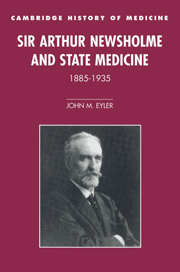Preface
Published online by Cambridge University Press: 04 December 2009
Summary
The half century between 1885 and 1935 witnessed a significant improvement in the health of the British people. Crude death rates offer the easiest, if least sensitive, measure. When this fifty-year period opened (1881–5) the crude annual mortality rate for England and Wales was 19.4 deaths per thousand population. By the turn of the century that rate had fallen to 17.7 per thousand (1896–1900), and by 1930 to 12.1 (1926–3o). Even more revealing is the downward trend in the death toll from the chief epidemic diseases which had been the focus of the nineteenth-century public health movement – cholera, typhus, typhoid or enteric fever, smallpox, measles, scarlet fever, diphtheria, whooping cough, diarrhea, and dysentery. During the last two decades of the nineteenth century the collective rate at which these diseases killed fell by more than a third (3,408 deaths per million annually in 1871–80 to 2,142 per million annually in 1891–1900).
These same decades also saw an unprecedented expansion of preventive and therapeutic services offered by the state through its local authorities. In 1885 the public health activities of most British local authorities were rudimentary. Even the most active confined themselves, for the most part, to environmental sanitation. Among civil authorities only the Poor Law Guardians offered medical treatment paid for by taxes or by rates, local property taxes. By 1935, on the other hand, almost the entire population of England and Wales had access to a wide range of both sanitary and clinical services offered by local authorities and supported by the rates and by grants from the national Treasury.
- Type
- Chapter
- Information
- Sir Arthur Newsholme and State Medicine, 1885–1935 , pp. xi - xviPublisher: Cambridge University PressPrint publication year: 1997

